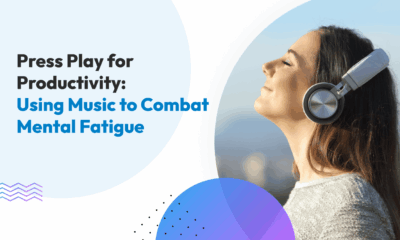Science Says
Talking Improves Mental Fitness: What Science Says About the Power of Conversation
Busy entrepreneurs and remote workers often miss opportunities to socialize and chat. No conversations by the water cooler, rarely catching up over lunch with friends and few of those random exchanges with people at the bus stop. This isolation due to lack of time or access to a social network affects not just emotional well-being but is associated with higher risks of cognitive decline and dementia, most especially in the elderly.
This study published in The Gerontologist, examined how something as simple as regular 30-minute conversations can help socially isolated individuals 75 years and older in terms of memory, emotional well-being, and overall cognitive health. The experiment offers interesting insights for those who may be missing some of that mental stimulation from regular social interaction.
Regular conversations can improve brain performance in as short as 6 months
For this study, researchers recruited 186 elderly participants who reported feeling isolated. One hundred of them had mild cognitive impairment (MCI), and the rest had normal cognitive function.
The experimental group underwent 4x weekly 30-minute video conversations with trained staff, covering topics that required thoughtful engagement. They spoke on specific topics under themes like history, philosophy, social issues, travel, and leisure activities. Both the control and experimental groups also had weekly 10-minute phone calls where they were asked about their health and social activities.
After just 6 months of 4x a week 30-minute conversations for the experimental group, those with mild cognitive impairment (MCI) showed significantly improved scores on a general cognitive function test, equivalent to being 10 years younger. Those with normal cognition showed improved performance on a verbal fluency test.
From 6 -12 months, the conversation frequency for the experimental group was scaled back to two 30-minute video conversations a week. At the end of this maintenance phase, those with MCI demonstrated improved performance on story recall tests, too.
Meanwhile, participants in the control group (both with MCI and normal brain function) did not see such gains in general cognitive function, verbal fluency, or story recall at the 6 and 12-month testing periods.
Action Item: This study suggests that regular, substantive conversations (not just transactional communications) could work like “mental workouts” and can yield benefits in the short and long term. Note that it wasn’t just those with mild cognitive impairment who showed improved scores; those with normal cognition also gained verbal fluency. Just as we include gym visits and physical activity in our weekly schedules, in-depth and intellectually stimulating discussions should be part of our mental fitness routine.

Video conversations were sufficient to produce these cognitive improvements
As the target population of this study is the elderly, who are likely challenged in terms of mobility, they used a simple video chat platform to conduct the regular conversations for the experimental group. Trained interviewers or conversation staff led the discussions and made them as natural as possible. They used visual aids and prompts, and also allowed the participants to choose the topic for the session to add motivation and interest.
Action Item: Engaging in conversation that strengthens cognitive skills need not be done face-to-face. Virtual, in-depth discussions can be effective cognitive exercises aided by the additional brain stimulation through visual cues, facial expressions, and body language.
Virtual co-working or meetings with online communities and video calls could take the place of catching up in person at a coffee shop or an office. And maybe you can skip the hours-long chats on Slack or voice note exchanges and have a proper conversation on a video call instead.
Are chats with acquaintances better for mental fitness?
The study touched on two distinct types of social connection: “social bonding,” as in close relationships with family and friends, and “social bridging,” which refers to interactions with a more diverse network of people with whom we may not be emotionally bonded.
Earlier research suggested that “…cognitive stimulation stemming from interactions with various social groups is more important for maintaining cognitive function than emotional bonding.” In short, social bridging was associated with better cognitive outcomes.
That is why, for this experiment, they rotated conversation staff to prioritize interactions with diverse, less familiar people. The novelty of engaging with people we aren’t close with forms part of the stimulation that helps mental sharpness.
Action Item: For business professionals, this implies that networking across different industries or engaging with diverse colleagues may provide cognitive benefits beyond career advancement.
But also, don’t limit yourself to having meaningful social interactions that are related to work. Take the chance to talk to a friend’s grandparents about life five decades ago. Spend a few minutes learning about gardening from the neighbor you occasionally say hi to. Interactions with a wider network of people and perspectives may be particularly beneficial for cognitive function.

But what about emotional well-being?
This study was not just focused on improving cognitive health for socially isolated elders. Regular conversations with unfamiliar people may have helped improve mental sharpness, but did this kind of intervention make the participants less lonely?
Surprisingly, in terms of feeling socially connected and happy, the impact of multiple weekly video conversations for the experimental group was not significantly different than the 10 minutes of weekly check-in phone calls for the control group. Both groups reported higher social satisfaction after 6 and 12 months.
Action Item: When we are at the point where we feel socially isolated, a 10-minute check-in phone call can be as effective as highly engaged discussions with acquaintances for our emotional well-being. Stimulating conversations with strangers can provide similar psychological benefits to having casual, quick social chats with family and friends.
So when you are feeling disconnected, you can at least slot in weekly 10-minute catch-up phone calls with friends or family to give yourself an emotional boost. And knowing that highly engaged social bridging interactions work as well, don’t hesitate to make those connections at a networking event or to strike up a conversation with people at the grocery store or the coffee shop!
Regular, structured conversations resulted in changes in the brain
Researchers managed to get 15 of the participants to undergo MRIs before and six months after the interventions to see how regular conversations would affect their brains. The experimental group showed increased connectivity in the Dorsal Attention Network (DAN), which refers to sections of the brain that help with focus and attention.
But because of the limited number of participants who completed the brain scans, researchers couldn’t draw strong conclusions from this finding. Nonetheless, the notion that even at an advanced age, the brain structure can still change with regular mental exercise is very encouraging.
Action Item: Treat structured, regular “social bridging” and stimulating conversations as part of a mental fitness routine. Make it a long-term investment in your cognitive health that could have preventive or delaying effects on cognitive decline.

Limitations of the Study
There are a few limitations to consider when applying its insights to broader populations. First, the participants were all aged 75 and older, which means the results may not directly translate to younger adults. However, it’s worth noting that some studies suggest that cognitive decline can begin as early as our 20s, making proactive measures like structured conversations valuable for people across different age groups.
Also, the study’s participant pool lacked diversity, which raises questions about how universally applicable the results are across different racial, cultural, and socioeconomic groups. Future research should aim to include more diverse populations to better understand how structured conversations impact cognitive health in a variety of contexts.
Wrap Up
While this research focused on older adults struggling with social isolation, the mechanisms underlying the benefits of social interaction can be a useful guide across age groups. For working adults, the takeaway isn’t necessarily to have four structured conversations weekly but to recognize that quality social interactions may provide cognitive benefits beyond the immediate social and emotional rewards.
Don’t let remote work setups or busy schedules get in the way of a simple mental fitness routine. Engaging in stimulating conversations, even virtual ones, with a diverse range of people can help keep your mind sharp and support your emotional well-being.












